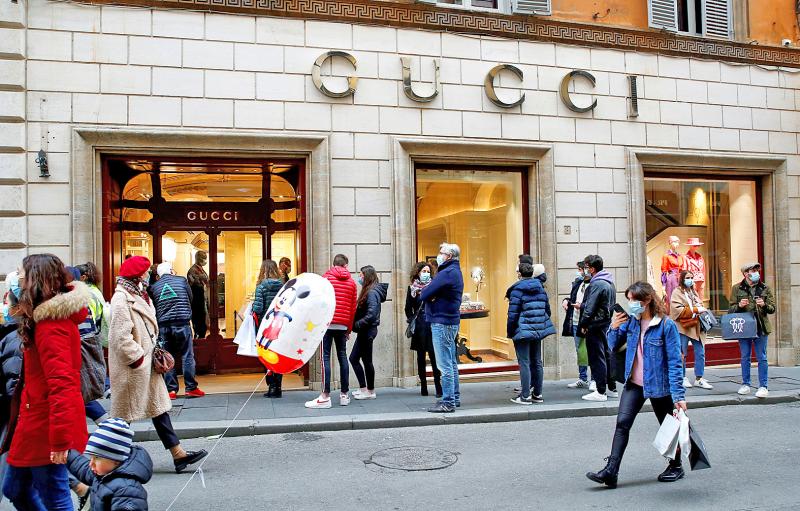Gucci sales fell for a fourth quarter, ending years of expansion as the luxury brand and growth motor of the global luxury group Kering struggled amid renewed COVID-19 lockdowns in Europe.
Revenue at the Italian luxury brand dropped 10 percent on a comparable basis to 2.28 billion euros (US$2.75 billion) in the three months through December, Kering said yesterday.
Analysts had expected a 7.2 percent decline.

Photo: Reuters
Gucci has been reducing its wholesale footprint as it bets this strategy would enable it to better control its image, as well as the pricing of its leather handbags and other items.
Analysts warned this move would hit revenue in the final three months of last year, but was the right decision for the longer term.
The luxury brand was also hurt by renewed lockdowns in Europe that shut stores during the period.
In a call with reporters, Kering chief financial officer Jean-Marc Duplaix said that negative trends continued in the region at the start of the year.
“Today’s statement is likely to be viewed negatively by the market,” Morgan Stanley analyst Edouard Aubin wrote in a note. “The miss at Gucci is entirely coming from retail.”
Gucci’s retail store sales fell 7.5 percent in the fourth quarter.
The pandemic brought an end to years of soaring growth at the Italian brand, which posted an annual revenue just shy of 10 billion euros in 2019.
Under the leadership of chief executive officer Marco Bizzarri and creative director Alessandro Michele, revenue more than doubled from 2015 to 2019.
The brand’s popularity on Instagram — the go-to social media platform for fashionistas — also boomed, with followers outnumbering those of rival Louis Vuitton.
Still, Gucci has sometimes been seen as too ostentatious, especially during pandemic times when consumers might be less keen to buy conspicuous items. While the brand is extremely popular in China, in Europe its client base is weaker, even though it is to celebrate its 100th anniversary this year.
The brand plans various actions for this anniversary, Duplaix said.
Kering carried out two phases of price increases on Gucci products last year, including in October, Duplaix said.
With sales growing in China as travel globally is restricted, luxury brands have been raising prices there. That has closed the gap with Europe, where tourists from that country used to splash out during visits.
“We are pretty satisfied with the price differential we have between regions nowadays,” he said, adding that there is room for “tactical” hikes when they are needed.
Meanwhile, Kering’s Bottega Veneta brand saw comparable revenue jump 16 percent in the period.
Analysts had expected a gain of 19 percent.
The brand has found success with some items, notably a padded leather cassette bag with a thick golden chain.
Kering’s annual recurring operating income fell 34 percent to 3.14 billion euros, beating analysts’ estimates of 3.08 billion euros.

Semiconductor business between Taiwan and the US is a “win-win” model for both sides given the high level of complementarity, the government said yesterday responding to tariff threats from US President Donald Trump. Home to the world’s largest contract chipmaker, Taiwan Semiconductor Manufacturing Co (TSMC, 台積電), Taiwan is a key link in the global technology supply chain for companies such as Apple Inc and Nvidia Corp. Trump said on Monday he plans to impose tariffs on imported chips, pharmaceuticals and steel in an effort to get the producers to make them in the US. “Taiwan and the US semiconductor and other technology industries

SMALL AND EFFICIENT: The Chinese AI app’s initial success has spurred worries in the US that its tech giants’ massive AI spending needs re-evaluation, a market strategist said Chinese artificial intelligence (AI) start-up DeepSeek’s (深度求索) eponymous AI assistant rocketed to the top of Apple Inc’s iPhone download charts, stirring doubts in Silicon Valley about the strength of the US’ technological dominance. The app’s underlying AI model is widely seen as competitive with OpenAI and Meta Platforms Inc’s latest. Its claim that it cost much less to train and develop triggered share moves across Asia’s supply chain. Chinese tech firms linked to DeepSeek, such as Iflytek Co (科大訊飛), surged yesterday, while chipmaking tool makers like Advantest Corp slumped on the potential threat to demand for Nvidia Corp’s AI accelerators. US stock

The US Federal Reserve is expected to announce a pause in rate cuts on Wednesday, as policymakers look to continue tackling inflation under close and vocal scrutiny from US President Donald Trump. The Fed cut its key lending rate by a full percentage point in the final four months of last year and indicated it would move more cautiously going forward amid an uptick in inflation away from its long-term target of 2 percent. “I think they will do nothing, and I think they should do nothing,” Federal Reserve Bank of St Louis former president Jim Bullard said. “I think the

Cryptocurrencies gave a lukewarm reception to US President Donald Trump’s first policy moves on digital assets, notching small gains after he commissioned a report on regulation and a crypto reserve. Bitcoin has been broadly steady since Trump took office on Monday and was trading at about US$105,000 yesterday as some of the euphoria around a hoped-for revolution in cryptocurrency regulation ebbed. Smaller cryptocurrency ether has likewise had a fairly steady week, although was up 5 percent in the Asia day to US$3,420. Bitcoin had been one of the most spectacular “Trump trades” in financial markets, gaining 50 percent to break above US$100,000 and